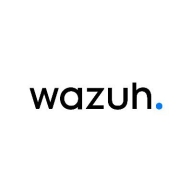

Darktrace and Wazuh are prominent solutions in the cybersecurity domain. Darktrace seems to have an edge with its AI-driven capabilities, while Wazuh is praised for its cost-effectiveness as an open-source solution.
Features: Darktrace leverages AI for threat detection, utilizing its Enterprise Immune System and Antigena technology, offering real-time insights and customizable network monitoring. Users favor its anomaly detection and automated responses. Wazuh stands out for its seamless integration capabilities, strong SIEM features, and compliance monitoring like PCI DSS, providing a flexible framework that supports a variety of security standards.
Room for Improvement: Darktrace users suggest improvements in endpoint protection and UI design, along with calls for fewer false positives and better third-party integration. Wazuh, on the other hand, could enhance its threat intelligence features and integration for larger enterprises and reduce manual configuration complexity while improving its threat detection abilities.
Ease of Deployment and Customer Service: Darktrace effectively supports on-premises and hybrid cloud deployments. Its setup is complex but generally well-regarded, with supportive customer service. Wazuh's open-source nature emphasizes community support, which can be challenging but also allows cost-effective deployment, though it may require more technical expertise.
Pricing and ROI: Darktrace is perceived as expensive with device connectivity-based pricing. Its advanced features are valued, but costs can be prohibitive for smaller organizations, though negotiated licenses can improve ROI. Wazuh offers greater affordability as an open-source solution, appealing to small organizations with costs primarily related to support and infrastructure needs, making it a financially flexible choice for varied business sizes.
Other NDR solutions provide virtual appliances that can be deployed on virtualization servers to get up and running quickly.
Using this solution provides financial benefits by securing from server attacks, which offers indirect savings.
I have seen value in security cost savings with Wazuh, as using proprietary EDR versions could save us substantial money.
The technical support from Darktrace is of high quality.
Darktrace provides excellent technical support with a monthly meeting to review platform incidents, ensuring the system functions as expected.
The challenge lies in waiting for a response after logging a ticket.
They responded quickly, which was crucial as I was on a time constraint.
We use the open-source version of Wazuh, which does not provide paid support.
The documentation is good and provides clear instructions, though it's targeted at those with technical backgrounds.
Darktrace has high scalability, and I would rate it a nine out of ten.
Since it's cloud-based, it expands easily.
There is still a gap in terms of storage, and we are trying to figure out how to increase that capacity for regulated environments, which require data retention for 5 to 6 years.
It can accommodate thousands of endpoints on one instance, and multiple instances can run for different clients.
Currently, I don't see any limitations in terms of scalability as Wazuh can still connect many endpoints.
Scalability depends on the configuration and the infrastructure resources like compute and memory we allocate.
The stability of Darktrace is excellent, rated ten out of ten.
The appliance itself has never let me down.
For stability, I would rate Darktrace an eight out of ten.
The stability of Wazuh is strong, with no issues stemming from the solution itself.
The stability of Wazuh is largely dependent on maintenance.
The indexer frequently times out, requiring system restarts.
There is no dedicated salesperson in Egypt, and having one would help to improve focus on this market.
They say they can integrate with most firewalls, but when we did an integration with Meraki MX firewalls, that integration didn't work and still doesn't work to this day.
We need Darktrace on each branch to get the data out, and I suggest having some kind of a centralized product that gets data from multiple sources to aggregate and provide the data.
Machine learning is needed along with understanding user behavior and behavioral patterns.
The integration modules are insufficiently developed, necessitating the creation of custom integration solutions using tools like Logstash and PubSub.
I think Wazuh should improve by introducing AI functionalities, as it would be beneficial to see AI incorporated in the threat hunting and detection functionalities.
The product is considered expensive compared to others.
The pricing is costly in USD, and they charge based on device counts.
The licensing cost is approximately eight dollars a year.
Wazuh is completely free of charge.
I would definitely recommend Wazuh, especially considering Fortinet's licensing model which is confusing and overpriced in my opinion.
Totaling around two lakh Indian rupees per month.
It is capable of responding to lateral movement and ransomware deployment within environments where there is data exfiltration.
I do not need to manually process incidents as Darktrace provides an incident summary, potential detection paths, and other details, all exportable with just a click.
If I am in a data center where I don't have layer two, it becomes an issue because the autonomous response is reliant on sending spoofed TCP resets to my core switch to block traffic, which is a major issue.
Wazuh is a SIEM tool that is highly customizable and versatile.
The system allows us to monitor endpoints effectively and collect security data that can be utilized across other platforms such as SOAR.
With this open source tool, organizations can establish their own customized setup.
| Product | Market Share (%) |
|---|---|
| Wazuh | 10.2% |
| Darktrace | 8.0% |
| Other | 81.8% |


| Company Size | Count |
|---|---|
| Small Business | 44 |
| Midsize Enterprise | 19 |
| Large Enterprise | 29 |
| Company Size | Count |
|---|---|
| Small Business | 26 |
| Midsize Enterprise | 15 |
| Large Enterprise | 8 |
Darktrace is a leading cybersecurity solution that leverages artificial intelligence and machine learning to provide advanced threat detection, response, and risk management capabilities. Many reviewers find Darktrace's AI and machine-learning capabilities to be valuable. They appreciate its ability to detect anomalies and threats that might go unnoticed by traditional security tools. Overall, the general sentiment towards Darktrace from reviewers is positive. Users seem to appreciate its scalability, stability, AI capabilities, visibility, and ease of use.
Darktrace offers a proactive and intelligent approach to cybersecurity. It utilizes AI algorithms to learn and understand the 'pattern of life' for every user and device within a network. This understanding enables it to detect anomalies that could signify a cyber threat, from subtle insider threats to more obvious ransomware attacks.
Its adaptability, autonomous response features, and comprehensive network visibility make it a top-tier solution for different sizes of organizations and across many industries. It was named one of TIME magazine’s ‘Most Influential Companies’ in 2021 and protects over 8,800 organizations globally from advanced cyber threats.
Darktrace Cyber AI Loop
The Darktrace Cyber AI Loop introduces an advanced artificial intelligence-based system for cybersecurity, designed to build a self-improving defense mechanism. This system functions like a closed loop, where each stage feeds information and insights into the next, amplifying the overall effectiveness of the platform.
The key components of the loop are:
Darktrace's AI algorithms can identify threats that traditional security tools might miss. It continuously learns and updates its understanding of what is normal for each environment, ensuring that it can quickly detect and respond to unusual activities that could indicate a breach. Darktrace's Antigena module can autonomously respond to threats in real time. This is particularly crucial in containing fast-moving threats like ransomware, where every second counts.
Darktrace's solution provides unparalleled visibility into all parts of the network, including cloud services, IoT devices, and industrial control systems. This comprehensive coverage ensures that no part of the network is left unprotected. However, while the Darktrace Cyber AI Loop offers a robust solution, it is not a complete cure-all and requires careful implementation and integration with existing security frameworks.Darktrace offers a comprehensive and unified approach to cybersecurity. It provides continuous protection against known and unknown threats, regardless of where they emerge. Darktrace's solutions provide visibility into your cloud infrastructure, continuous monitoring of application usage and communication patterns (e.g., identification of suspicious actions like unauthorized data access), comprehensive email security that goes beyond traditional spam and phishing filters, real-time protection for endpoints, and continuous monitoring of network traffic and device activity.
Darktrace also provides specialized coverage to secure your zero-trust architecture. Identifies compromised identities, unauthorized access attempts, and risky data exfiltration within a least-privilege environment. Finally, it has a dedicated solution for safeguarding industrial control systems and critical infrastructure. Monitors communication patterns, device behavior, and physical access within OT environments, protecting against operational disruptions and cyberattacks.
Wazuh offers comprehensive security features like MITRE ATT&CK correlation, log monitoring, and cloud-native infrastructure. It ensures compliance and provides intrusion detection with high scalability and open-source flexibility, ideal for businesses seeking robust SIEM capabilities.
Wazuh stands out in security information and event management by providing efficient log aggregation, vulnerability scanning, and event correlation against MITRE ATT&CK. Its capability to integrate seamlessly with environments, manage compliance, and monitor files makes it suitable for cloud-native infrastructures and financial sectors. Despite its technical support needing enhancement and opportunities for improving AI integration and threat intelligence, its open-source nature and cost-effectiveness make it appealing. Users can leverage custom dashboards powered by Elasticsearch for precise data analysis, even though there is a desire for a more user-friendly interface and better enterprise solution integration. Deployment may be complex, but its features contribute significantly to fortified security postures.
What are the essential features of Wazuh?Industries like finance and cloud infrastructure heavily utilize Wazuh for its security strengths. By monitoring endpoints and ensuring compliance with frameworks, companies can improve security posture and swiftly detect anomalies. The platform's focus on event correlation and alerts for security incidents is particularly beneficial.
We monitor all Extended Detection and Response (XDR) reviews to prevent fraudulent reviews and keep review quality high. We do not post reviews by company employees or direct competitors. We validate each review for authenticity via cross-reference with LinkedIn, and personal follow-up with the reviewer when necessary.